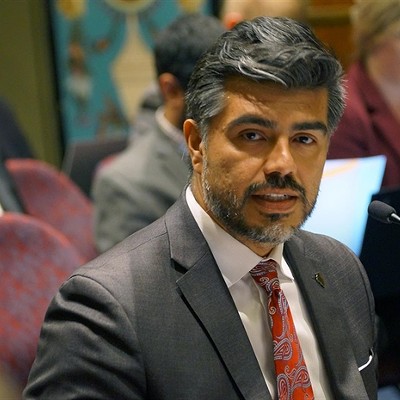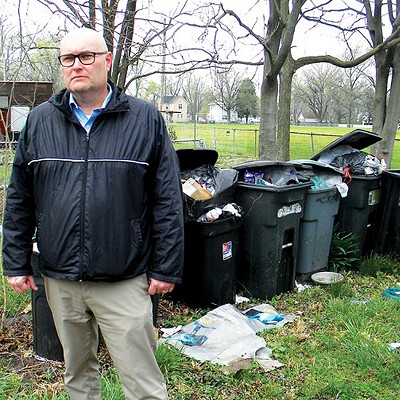A police misconduct lawsuit against the city of Springfield ended in a mistrial Oct. 4 amid allegations that the city hid evidence that it was required to share with other parties in the case.
U.S. District Court Judge Sue Myerscough ordered a hearing for Nov. 20 to consider sanctions against the city. It is reportedly the first time Myerscough has declared a mistrial in her 40-year state and federal judicial career.
The lawsuit was filed in 2018 by Toni Wilson, a Springfield woman who was shot three times on her front porch just days after a Springfield police sergeant referred to her son as a "snitch" in a video live-streamed on Facebook.
Police Sgt. James Wangard told a suspect he was arresting that her son, Steven Wells, was "the snitch" that provided the information that led to his arrest. Wangard's allegations were captured on a Facebook Live broadcast that was repeatedly shared.
Two days later, two men opened fire on Wilson as she sat on the front porch of her Poplar Place home, wounding her three times. While Wilson has no criminal record, her son is alleged to be a member of a street gang.
Louis Meyer, the lawyer representing Wilson, said documents withheld by the city bolster his theory that the shooting was committed by members of a rival gang angered by the assertion that Wilson's son had informed on them.
Deputy Chief of Administrative Services Josh Stuenkel testified that Wangard was merely joking.
Meyer said the city did not turn over evidence during the legal discovery process as it was required to. Discovery is the process of obtaining and disclosing evidence within a case.
"We realized they did not tender to us during the entire case hours and hours of body camera footage, interviews, photographs – all related to this, the shooting of our client," Meyer said.
Upon learning that this information had been withheld, Myerscough issued an order midtrial for it to be turned over, he said.
"Their solution was to give us all of this information over lunch," said Meyer. "There were interviews of witnesses that were summarized in the police reports, which (had been) read to the jury, which were inaccurate – they did not truly and accurately reflect everything that was said in those interviews. So, it's very prejudicial."
Meyer said documents turned over in the midst of the trial said the two men police suspected committed the crime were members of a rival street gang. He added there also was evidence that one of these men had watched the video in which Wangard claimed Wilson's son was a snitch.
"(This) undercut their theory that we could not show the shooter had watched the video. And so, at that point, we objected again, and I assume the judge realized the prejudice we had and granted a mistrial," he said.
Meyer said he anticipates taking this case to trial again. But he said he will seek during the sanctions hearing for the city to reimburse his Chicago law firm for the cost of preparing for the trial, which was ended by Myerscough before it went to the jury for deliberations.
Meyer said it is unclear to him whether the alleged lack of compliance is the result of decisions made by municipal lawyers involved in the case or the police department not cooperating with its own lawyers.
Springfield Corporation Counsel Greg Moredock said, "The city is going to present the justification for its actions at this Nov. 20 hearing." He added the city is not prepared to comment further on the substance of the case because it is pending litigation.
He declined to discuss for the record what fines or sanctions the municipality could face if imposed.
Moredock, who replaced Jim Zerkle as Corporation Counsel in June following the election of Mayor Misty Buscher, said turnover within the city's legal department during the past five years has created challenges.
"Part of the process between now and Nov. 20 is looking at prior counsel's notes and files to definitively look at the allegations that were made during the mistrial arguments. It's just a fact that two different attorneys did the discovery process and both of them have left (city employment). ... Part of the issue that we're dealing with is losing the institutional knowledge that you (would) have when one attorney takes a case from start to finish."
Stuenkel testified that Wangard made his statement in a "jovial" manner and added it is unlikely anyone took it seriously.
But Meyer ascribed more sinister motives to Wangard's actions. "It is unconscionable. They want to stoke a gang war or stoke violence. And their defense was that it was a joke and everyone should have known it was a joke."
Meyer said an audio recording made by investigators who interviewed the juvenile who was being arrested when Wangard made the broadcast statement show that the sergeant's remarks were indeed taken seriously.
Meyer noted this statement was not reflected in the summary of the investigation provided by the city during discovery.
Meyer said Wangard received a three-day suspension for the incident and is now responsible for overseeing the police department's informants.
Scott Reeder, a staff writer for Illinois Times, can be reached at [email protected].




















